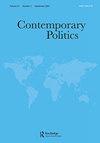The failed construction of fake news as a security threat in Malaysia
IF 2
3区 社会学
Q1 POLITICAL SCIENCE
引用次数: 2
Abstract
ABSTRACT This article examines developments in Malaysia regarding ‘fake news', analyzing how state actors sought to securitise the issue - or construct it as a national security threat - to justify broad crackdowns. As a research focus, it asks: how has the previous administration under PM Najib Razak sought to crackdown on fake news? Why were the securitisation efforts resisted, leading to the repeal of the Anti-Fake News 2018 bill? Drawing on primary survey data and through a case study, this study finds that the securitising actors' lack of legitimacy, low resonance of discourses employed, and the presence of a credible opposing narrative are important factors leading to securitisation failure. Interestingly, results show that although the threat of fake news had acquired a broad consensus, efforts to frame it as a threat lapsed because the actor's legitimacy was in doubt. Empirically, this study sheds light on policymaking processes in Malaysia, a ‘flawed semi-democracy’.假新闻在马来西亚的安全威胁建构失败
本文探讨了马来西亚关于“假新闻”的发展,分析了国家行为者如何试图将这个问题证券化-或将其构建为国家安全威胁-以证明广泛打击的合理性。作为研究重点,它提出了这样一个问题:纳吉布·拉扎克(Najib Razak)总理领导下的上届政府是如何打击假新闻的?为什么证券化的努力遭到抵制,导致《2018年反假新闻法案》被废除?根据初步调查数据并通过案例研究,本研究发现证券化行为者缺乏合法性,所使用话语的低共鸣以及可信的对立叙事的存在是导致证券化失败的重要因素。有趣的是,结果显示,尽管假新闻的威胁已经获得了广泛的共识,但由于演员的合法性受到质疑,将其定性为威胁的努力失败了。从经验上看,这项研究揭示了马来西亚这个“有缺陷的半民主国家”的决策过程。
本文章由计算机程序翻译,如有差异,请以英文原文为准。
求助全文
约1分钟内获得全文
求助全文

 求助内容:
求助内容: 应助结果提醒方式:
应助结果提醒方式:


